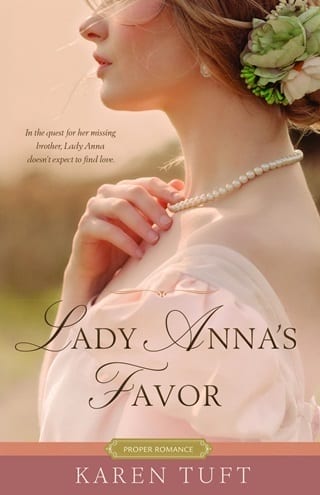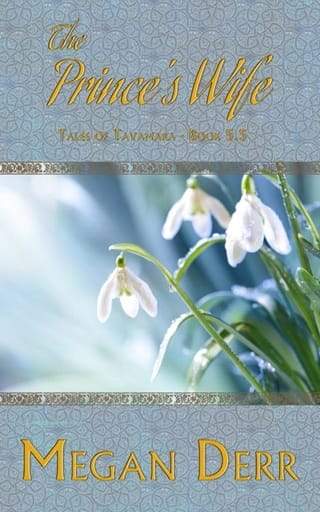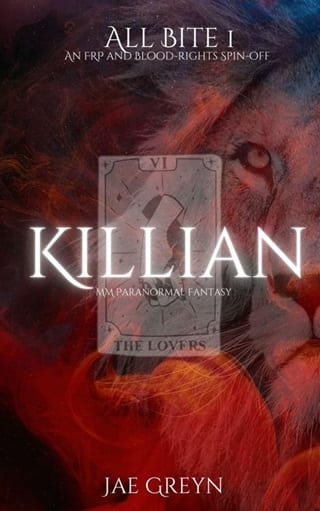Chapter 18
W hen Anna awoke the next morning, she felt more rested and revived than she could remember in the longest time. What a glorious miracle had occurred yesterday! She stretched her arms over her head and yawned in a completely unladylike manner and then slipped out of bed and into her robe.
Her door opened, and Mary came in bearing hot cocoa. “Good morning, me lady,” she said. “Mr. Jennings asked that we inform ye that he left to run a few errands this morning, but not to worry; he would be back in time to escort ye back to yer brother. Oh, me lady! I was that glad that ye found Mr. Avery—I mean, Lord Westbury! Mr. Sparks and me was over the moon with the news last evening, as ye well know. We still can’t quite believe it!”
“My brother was exceedingly glad that you and Sparks were with me,” Anna said with a smile to her dear maid. She took a sip of the cocoa, which was delicious and not too hot, so she drank readily. “We are meeting with him and his wife for luncheon.”
“Very good, me lady.” Mary bustled away to prepare Anna’s clothes.
Anna wondered what errands James could possibly have in an unfamiliar city such as Toulouse, but she dressed quickly, eager to be downstairs in the main room of the inn when he returned.
It was just after noon when James returned from his errands. He looked invigorated; his eyes were bright, and he was so handsome that Anna wished she could wrap herself in his arms to feel his masculine warmth and smother him with kisses.
“Good morning—erm, good afternoon,” he said, correcting himself. “You look utterly beautiful, my Anna. You glow with happiness.” He took her hand in his and placed a sumptuous kiss upon it, which made her heart burst with joy. “Are you ready to stroll to the café?”
“More than ready,” she said.
He placed her hand in the crook of his arm.
It could have been raining torrents, there might have been lightning strikes and booms of thunder, but Anna doubted she would have noticed. All she could see was James’s profile as they strolled down the street to where Avery was standing with Jeanne outside the café, waving at them in greeting as they approached.
The café owner, Monsieur Remy, showed James and the others to a private nook, which was separated from the rest of the café, and insisted on serving them himself.
“Jeanne’s papa insisted on the finest of luncheons,” Westbury said once they were seated and Monsieur Remy had returned to the kitchen. “He said, ‘Only the best for my new son and his family.’”
“This must all be rather strange for him too,” James observed.
“I shall be sure to thank him, Avery,” Anna said. “I can never repay him; I owe him the world.”
Avery smiled and rested his hand upon Jeanne’s and quietly translated Anna’s words to her, to which she replied.
“Jeanne says she and her papa have been blessed too,” he said, gazing lovingly at his young French wife.
“Before we dine,” James said, “there are a few legal items I spent time researching this morning that I think are important to share with all of you.”
“Legal items?” Westbury asked. “What can you have learned in only a few hours this morning that could possibly be of such import?”
“My original background,” James began, “is in the law. It, along with a modest gift for languages, allowed me to be of service to the Foreign Office and Lord Castlereagh when it came to legal matters, negotiations, and diplomacy amongst the Coalition members and others.
“When we found you and learned you are alive and well, but especially after meeting your lovely Jeanne here, I thought it prudent to research French marriage laws—something I had never thought to do, it having never arisen in my work before. Your marriage raised legal concerns in my mind. After visiting the local magistrate and a couple of local law offices, I learned that a marriage conducted in France for persons who are not French citizens is binding while in France ... but they make no guarantee that the marriage is binding in the person’s home country, whatever country that may be.”
“Goodness!” Anna exclaimed, turning to look at her brother.
“So,” James continued, “while you are legally married here in France, there is no assurance that your marriage would be legal were you to return to England. For you , Lord Westbury, it means that you are indeed married to Jeanne as long as you choose to remain in France. But should you choose, at any point, to claim your inheritance in England, along with the earldom—or more to the point, should you have any children after having married in France but not in England, there could be complications in determining if those children are indeed legal heirs. I am not in a position to comment on the intricacy of the marriage laws of England at the moment, obviously. There may not be an issue at all. Nonetheless, I personally would advise you, at the very least, to travel to England to marry there in order to assure your progeny of their rightful claim going forward, should they desire it at some point in the future.”
Westbury appeared shocked, and James waited as the man swiftly translated this information to his wife. Not unexpectedly, Jeanne gasped.
“My presumption—indeed, the entire direction of my life has always been based on the fact that I was the spare,” Westbury said after he finished reciting James’s information to her. “Knowing that, I was content to remain here in France with Jeanne and her father. I wrote precisely that in one of my letters shortly before Jeanne and I married. I could not have known what had happened to Papa and John,” Westbury added specifically to Anna. “I grieve deeply for them.”
“I know that, Avery,” Anna said, reaching for his hand.
“What do you plan to do about it now that you do know, Lord Westbury?” James asked quietly and then translated the question into French for Jeanne’s sake. “What of your title as earl?” he added, continuing to speak intentionally in French. “Will you allow your family’s heritage to be destroyed by a person who holds the title and estate in such low regard? What of any children you and Jeanne have? What will you tell them about the heritage you allowed to be taken by a usurper?”
Jeanne grabbed Westbury’s arm, her eyes even wider, an expression of shock on her face. “Avery! You never said your father was one of those English earls!” she exclaimed.
“It hardly mattered at the time, my dear,” Westbury replied, stroking her cheek gently. “I was never intended to inherit. It is why I bought my commission in the army; I needed to make my own way in the world. And it brought me to you, my love.”
“It brought you to me, yes, and for that I am glad,” she replied. “But we live at a café, where you wash dishes and prepare food. Yet now we find that you are an English earl?”
“None of that mattered to me,” Westbury told her gently. “Only that I had finally found my place. With you.”
“Sometimes our ‘place,’ as you called it, changes,” James said. “I was a contented solicitor, making excellent money when duty called. My ‘place’ was an assignment extended to me through connections to Lord Castlereagh. It was not my choice, but I did my duty and changed my ‘place’ because it was the right thing to do at the time.
“Now that you know all this, I suspect the two of you will need to have a serious conversation about the future of your family, your children, and what to expect going forward, knowing now that you are indeed the Earl of Westbury,” James said. “At least, for the time being, unless you choose to renounce your title.”
The luncheon was delicious. Monsieur Remy had outdone himself. Not surprisingly, the discussion ebbed and flowed and alternated between English and French after James’s news and what it might mean to everyone involved. Anna had the odd thought that many of James’s official meetings and meals must be much like this one—addressing legal issues, formally and informally, with various languages weaving in and out amongst those in attendance. It was a part of his world that she had now been able to glimpse.
Once everyone seemed to have had their fill of food and information, James stood and offered his hand to Anna, which she took and rose to her feet. “With your permission, I should like to take Anna for a stroll.”
“It would seem Jeanne and I have a discussion we need to have as well, which will undoubtedly involve her father too.”
“I think including him in your conversation is generous and wise,” James replied. “Come, Anna.”
She nodded her consent and slipped her gloves on.
He tucked her hand securely into the crook of his elbow. They walked along the side of the café, and Anna was half-expecting to find a well-tended garden. It was what had happened in Paris and again on their way to Orleans. It had almost become routine.
They didn’t find a garden, but there was a quiet lane just beyond the café. James led her down the lane, and they continued farther until they were by the river that ran through the city. Once there, James led her to a shaded bank that overlooked the water.
“This is nice, don’t you think?” James said. He looked at her for her approval, which she gave once again with a nod of her head.
“It’s lovely,” she replied. “I suppose you found it during those errands you undertook this morning.”
“Guilty as charged,” he said with a smile.
He removed his jacket and laid it out on the grass and assisted her in sitting on it. He then sat on the grass next to her—near enough to her that she could feel the warmth of his body.
They sat quietly for a while and watched the gently flowing river. Anna shielded her eyes and could make out an arched bridge in the far distance.
“Anna,” James said at last, breaking the silence and drawing even closer to her. “I can but look at you and I am your servant in all things.” He took her hand and brought it to his lips. “You cannot know what a challenge it has been for me to remain the gentleman during our travels and not take you into my arms even more than I have. There is nothing I wish more than to know today, now, that I truly have earned your favor and that you will agree to be my wife sooner rather than later, my dearest Anna, my pearl. I would marry you tomorrow if I could.”
Once again, Anna could scarcely breathe from the feel of his kiss, even through her gloves. His words struck deep within her, and her heart rejoiced.
He gently peeled off her glove, one finger at a time, and drew her hand—bare and vulnerable as it was now—to his lips.
Anna stared at her hand, at his handsome face, and at those masculine lips as they kissed each of her fingers. And then James turned her hand over and kissed her palm and then her wrist, his eyes nearly shut, and Anna felt her own eyelids flutter from the feelings that coursed through her from her fingers to her toes, making her heart pound. She thought she might swoon.
“Oh, James,” she found herself saying with only the faintest of breaths.
She stopped breathing entirely when he reached into his pocket and removed a ring—a pearl ring, the most lustrous pearl she’d ever seen, surrounded by diamonds. She stared at the ring and then looked into his eyes. His handsome brown eyes were darker than she’d ever seen them, and his gaze pierced her very core.
“May I?” James asked.
She nodded, so he slipped the ring onto her finger. “My darling Anna,” he murmured. “My beautiful pearl.” He brushed a curl from her forehead and captured her lips again. And as they had before, the sensations burst through Anna. His lips were soft, cool, hot, delicious, and all too soon, he’d removed them from her own, but only so he could shift even closer to her. He moved his hand to cradle her face. “You turned my life upside-down, and I cannot regret it for a moment,” he whispered, his lips so close to her own that she could feel his breath. And then his lips found hers again, and she could only feel.
Her hand slid up to his shoulder, and she held on for all she was worth. Never could she have believed that the mere touch of his lips would send her spinning. Never had she felt such things before meeting James Jennings.
He began to end the kiss, but she wasn’t ready to be released from this newly discovered ecstasy. Her hand quickly slid from his shoulder to the back of his head to hold him close. She felt the quick puffs of breath as he chuckled softly, and then he kissed her again, firmly, possessively, and she thought she might burst into flames.
“My dearest Anna,” he whispered at length after ending their delicious kisses and resting his forehead against her own, which made her bonnet slip back on her head a bit. “You are my dearest Anna, aren’t you? And I am your James and will be hereafter and always.”
Anna laughed and nodded, which was the wrong thing to do when one’s forehead was resting against someone else’s, for it jostled her bonnet further until it slid down to her neck.
James laughed, too, and helped place it back on her head; she stood absolutely still while he tied the bow. “There now, despite the color in your cheeks and your beautiful, kissable lips, you look as you did before we ventured here.”
“James?” she said softly.
“Yes, my Anna?” he replied.
“Be quiet, my dearest love, and kiss me again,” she said.
And so he did.
It lasted much longer this time.
And Anna sensed that James’s kiss was meant to convey something more than mere passion. The fire was there—oh, indeed it was—but there was much more to it too. A oneness, an unspoken commitment, even a certain possessiveness, although it in no way held her captive but was more of an assurance that truly, she was his as he was hers.
 Fullepub
Fullepub 



